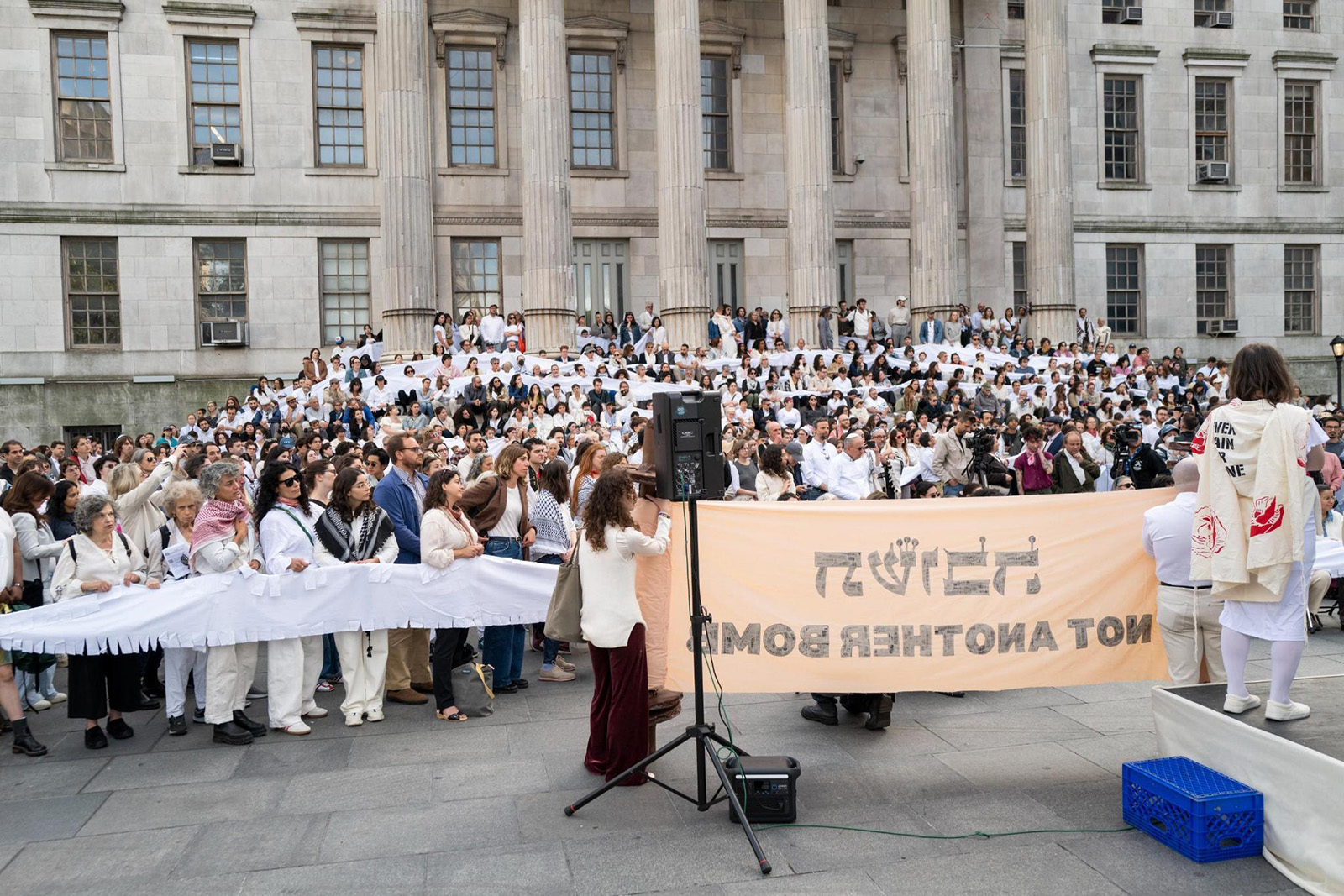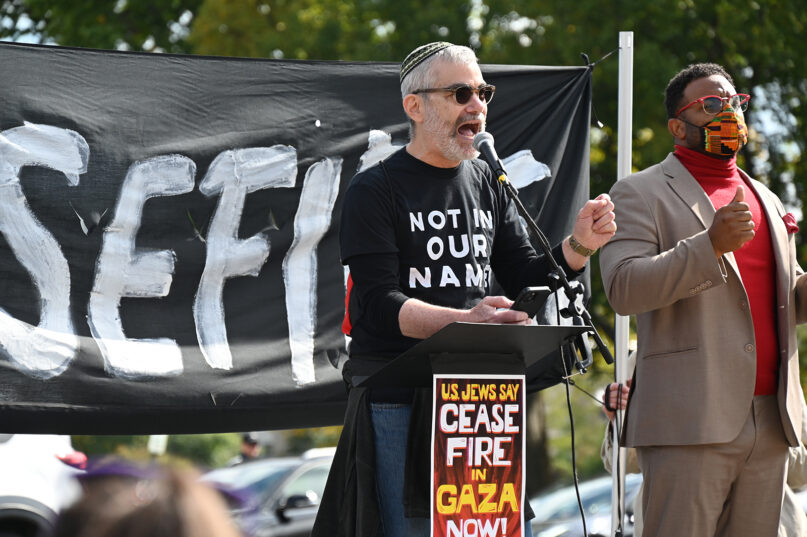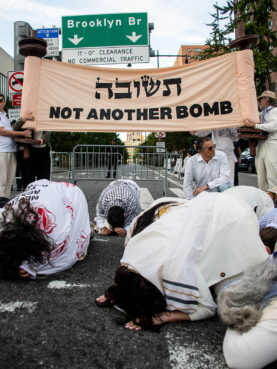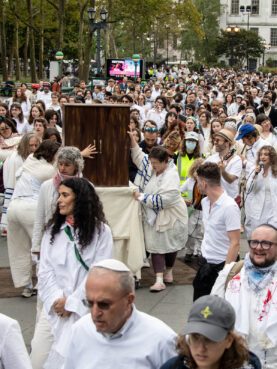
(RNS) — This coming week, a group of rabbis who had been pushing for a ceasefire in Israel’s military campaign in Gaza will gather online for a town hall meeting.
Over the past two years, the group, Rabbis for Ceasefire, has grown to 420 rabbis and cantors and become a powerful force on the American Jewish left since Israel launched its retaliatory attack on Gaza in response to the Oct. 7, 2023, Hamas attack on Israel. Now that a ceasefire has been declared between Israel and Hamas, the group has no plans of disbanding.
In fact, it plans to redouble its efforts.
Jews around the world rejoiced earlier this week after the release of the final 20 living hostages to Israel from Hamas captivity. On Wednesday (Oct. 15), Simchat Torah, the holiday marking the end of the High Holiday season, many celebrated with an extra dose of joy. But for all the relief and exultation, many American Jews are concerned the ceasefire remains tenuous. Hamas has yet to return some 20 bodies of hostages who died in captivity, and Israel appears ready to retaliate with restrictions on humanitarian aid. Beyond that, there is deep concern for the fate of Palestinians, who face bleak prospects in a completely devastated Gaza Strip.

Rabbi Alissa Wise. (Photo by Jess Benjamin)
Jewish activists as part of Rabbis for Ceasefire want to continue to build pressure to ensure Palestinians have a hope for a brighter future, too, one that guarantees them physical and political freedom. Their town hall meeting this coming Monday is billed not as a retrospective on their accomplishments but as a strategy-setting session intended to map out future actions.
“We’ve always said our work is two-pronged — bringing our moral power as rabbis to the fight for ceasefire and safeguarding Judaism for future generations,” said Rabbi Alissa Wise, the group’s founder. “And in a lot of ways, that work is just beginning.”
RELATED: A look at the living hostages released by Hamas under ceasefire deal
Two years after the start of Israel’s devastating campaign in Gaza, which some human rights experts have deemed a genocide, a growing number of American Jews have peeled away from mainstream Jewish institutions whose support for Israel has remained steadfast. A Washington Post poll published earlier this month showed half of American Jews opposed Israel’s actions in the war. Sixty-one percent believe Israel has committed war crimes and 39% believe it has committed genocide, according to the survey. Perhaps most striking is the generational divide. Among American Jews ages 18 to 34, only 36% say they are emotionally tied to Israel, compared with 56% of all American Jews.
This deepening conflict over Israel has led to a widening breach among American Jews. Since 2023, about three dozen synagogues and prayer groups across the country have declared themselves non-Zionist or anti-Zionist. The American Council for Judaism, once the most prominent American Jewish anti-Zionist organization, has been resurrected from obsolescence. And a new institutional framework for anti-Zionists, called the Jewish Diaspora Movement, is expected to launch early next year.

Rabbi Brant Rosen, head of Tzedek Chicago, speaks during a ceasefire rally, Oct. 18, 2023, on the National Mall in Washington. (RNS photo/Jack Jenkins)
“The proliferation of Jewish communities that are anti-Zionist or non-Zionist has been very dramatic,” said Rabbi Brant Rosen, the founding rabbi of Tzedek Chicago, the first progressive anti-Zionist congregation in the country.
Rosen said he does not envision a loss of momentum for pro-Palestinian activism among American Jews on the left. He expects to see Palestinian flags during No Kings protests planned for Saturday across the country, especially in Chicago. And he expects activism around Israel’s oppression of Palestinians to merge with campaigns opposed to Trump’s immigration crackdown and the militarized use of federal immigration agents in U.S. cities.
“We have no illusions about Donald Trump as a quote-unquote peacemaker,” Rosen said. “He is fomenting militarism and victimizing citizens and residents in his own country. We’re learning that it’s important not to see these as isolated issues where one can eclipse the other.”
Stefanie Fox, executive director of Jewish Voice for Peace, said the world has woken up to Israel’s abuses and stands ready to challenge its impunity. Her group, numbering 720,000 members and supporters, will continue to call for accountability for Israel’s crimes in international courts, a U.S. arms embargo of military aid to Israel and a boycott against it.
Jews in their 20s, 30s and 40s, are increasingly drawn to a Judaism beyond nationalism, said Rabbi Andrue Kahn, executive director of the American Council for Judaism. The group, originally founded in the 1940s by Reform Jews, was recently reconstituted and now offers two introduction to Judaism classes, with a third class beginning next year, and online public education series.
Kahn, 41, was working at Congregation Beth Elohim, a Reform temple in Brooklyn, New York, and left last year to become executive director of ACJ.
“There are just tons of people who are really seeking a progressive Judaism that isn’t centered around Zionism and isn’t centered around Jewish nationalism, and is instead centered on the kind of universal values found throughout the ethical teachings of Judaism,” Kahn said.
A letter signed by almost 200 “synagogue-involved Jews and families” that recently circulated in Jewish circles seemed to capture the mindset of many on the left for whom the Gaza war changed their calculus on Israel and broadened their understanding of what it means to live a life based on Jewish values.
“We, the undersigned, are synagogue-involved Jews and families who value Israeli and Palestinian life equally as a matter of theological and moral principle,” the letter reads. “We believe synagogues should be inclusive religious spaces in which Jewish particularism is ethical, empathy is always embraced, and participation does not depend on politics.”
RELATED: As Gaza ceasefire takes hold, Vatican seeks to mend strained ties with Jewish leaders


